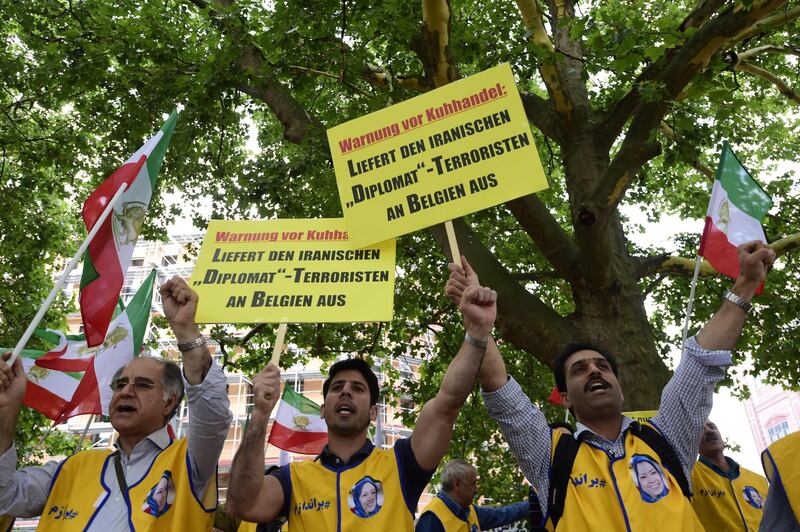A German court has approved the extradition of an Iranian diplomat accused of handing bombers half-a-kilo of explosives to blow up an opposition rally in France.
Assadollah Assadi is wanted in Belgium for his alleged central role in organising a failed attack against the National Council of Resistance of Iran (NCRI) at an event near Paris on June 30 attended by thousands of supporters and high-profile backers.
Belgian police said they foiled the plot when they stopped a Mercedes car driven by an Antwerp-based Iranian couple and found the explosive hidden inside a toiletries bag.
Mr Assadi is accused of passing the high explosive to the couple during an earlier meeting in Luxembourg.
The court ruled out diplomatic immunity for the alleged spymaster based in Vienna, Austria, because he was on holiday in Germany at the time of his arrest in July, rather than on diplomatic duties between Iran and Austria. He was accused with activity as a foreign agent and conspiracy to commit murder.
German prosecutors are now reviewing the extradition decision. It was not immediately clear on Monday when Mr Assadi would be sent to Belgium.
Members of the Iranian opposition claim that Mr Assadi played a pivotal role as head of intelligence for Europe since 2014 and had previous experience in handling explosives and demolition.
The regime’s embassy in Vienna, where he was based on the third floor, is seen as a major hub for the intelligence ministry (MOIS) in Europe.
The opposition claimed that his immediate boss was Reza Amiri Moghaddam, a key figure within the ministry, who reported directly to the regime’s intelligence minister.
They claim that Mr Assadi was put in personal charge of the operation to bomb the French rally because of the sensitivity of targeting mainland Europe.
_______________
Read more:
[ Iranian diplomat accused of running web of spies across Europe ]
Iranian diplomat suspected in France bomb plot to be sent to Belgium
Iran diplomat among six held over plot to bomb opposition group
_______________
Mr Assadi allegedly sought to distance the regime from the plot by using a Belgium-based sleeper cell to carry out the attack.
Belgian nationals Amir Saadouni, 38, and his wife Nasimeh, 34, lived in Antwerp for up to 15 years before they embarked on the operation, friends told The National.
The couple were stopped on the outskirts of the Belgian capital as they headed to Villepinte, France, where Donald Trump’s lawyer, the former New York mayor Rudy Giuliani, and the former House of Representatives speaker Newt Gingrich were both attending the conference. The remain in detention in Belgium.
Another alleged Belgian accomplice, identified as Merhad A, has also been extradited from France.
NCRI claims that Iranian agents have stepped up their activities in the West since the start of 2018, citing alleged plots in Albania – the base for the exiled opposition group - and spying operations against activists in the United States.
The US Secretary of State, Mike Pompeo, said earlier in June that Iran “conducts covert assassination operations in the heart of Europe” but gave no further detail.
The potential attack in France came a month after Mr Trump pulled the United States out of the landmark nuclear deal.
Analysts said any attack would have been highly provocative on the eve of a visit to Europe by President Hassan Rouhani to lobby European leaders to continue with the deal. Analysts said the potential attack could have been an attempt by regime rivals to undermine his leadership.
Iran’s deputy foreign minister Abbass Araghchi called the allegations a “plot aimed at damaging EU-Iran relations” and denied involvement in any plot.
The NCRI is controlled by the militant Mujahedin-e-Khalq which has long been considered a terrorist organisation by Tehran and has sought to disrupt its activities. It has been banned in Iran since 1981.






